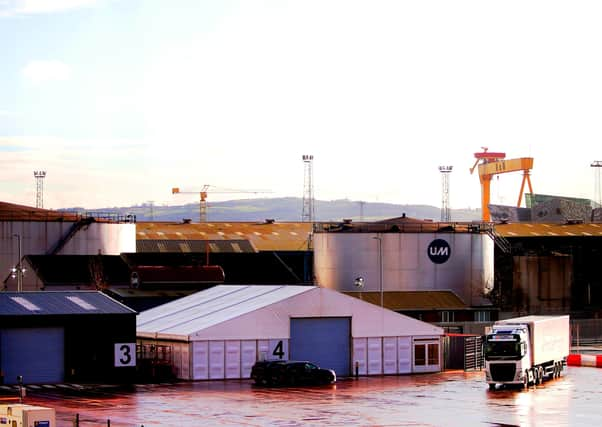‘No sea border? NI Secretary Brandon Lewis must have had too much wine’


John Martin made the jocular remark as he set out for the News Letter exactly how the sea border is in fact operating for shipping firms.
Mr Martin is the former chief enforcement officer at the DVA, and later headed up all vehicle enforcement for the Department of Infrastructure.
Advertisement
Hide AdAdvertisement
Hide AdNow he is the Northern Irish policy manager for the Road Haulage Association.
He was specifically referring to a statement on New Year’s Day from Mr Lewis, when he had said: “there is no ‘Irish Sea Border’” – even whilst port checks were visibly taking place on lorries arriving from Great Britain.
Mr Martin is absolutely clear, based on his experience of the last few days: “There is a border down the Irish Sea.
“If there was no border, then why do you need border control posts?”
Advertisement
Hide AdAdvertisement
Hide AdHe said that “we won’t get a true picture until probably next week – things are still relatively quiet so the system isn’t being pressure-tested”.
But even so, he told the News Letter of some of the haulage headaches which businesses faced over the weekend.
At one point, a lorryload of food had waited at Belfast port for 20 hours, due to issues with paperwork.
Following that, hauliers refused to pick up another five or six lorry-loads of food in GB.
Advertisement
Hide AdAdvertisement
Hide AdThe reason? If their paperwork was wrong too, it could leave half-a-dozen drivers stranded in Northern Irish ports – and they were not prepared to risk that.
“The difficulty is that some of the food products would’ve been going into the manufacturing and supply chain; they’re raw materials,” said Mr Martin.
“Whenever they don’t come in, the product they were going to be made into is not made... it’s a knock-on effect on the manufacturing base.”
Perhaps the biggest problems were SPS (sanitary and phytosanitary) checks for goods coming into Northern Ireland, he said.
Advertisement
Hide AdAdvertisement
Hide AdHe said this may only be felt a few weeks from now, when shops begin running low on stock “and they start noticing a certain product isn’t available”.
Another major problem is that once food goods are loaded on to a lorry, it is then supposed to be sealed until it arrives in Northern Ireland.
But it is often the case that lorries pick up some of their cargo in one town, then move to another town and pick up some more, and so on, until the lorry is full.
“It means that you’ve a vehicle potentially coming to Northern Ireland with only four pallets in it, as opposed to 26 pallets,” he said.
“It’s not viable.”
Advertisement
Hide AdAdvertisement
Hide AdHe noted that at present, goods destined for supermarkets have a three-month “grace period”, and problems may be exacerbated when that runs out.
“Unfortunately, I think it’ll probably get worse before it gets better,” he concluded.
Read more on Brexit:
A message from the Editor:
Advertisement
Hide AdAdvertisement
Hide AdThank you for reading this story on our website. While I have your attention, I also have an important request to make of you.
With the coronavirus lockdown having a major impact on many of our advertisers — and consequently the revenue we receive — we are more reliant than ever on you taking out a digital subscription.
Subscribe to newsletter.co.uk and enjoy unlimited access to the best Northern Ireland and UK news and information online and on our app. With a digital subscription, you can read more than 5 articles, see fewer ads, enjoy faster load times, and get access to exclusive newsletters and content.
Visit https://www.newsletter.co.uk/subscriptions now to sign up.
Advertisement
Hide AdAdvertisement
Hide AdOur journalism costs money and we rely on advertising, print and digital revenues to help to support them. By supporting us, we are able to support you in providing trusted, fact-checked content for this website.
Alistair Bushe
Editor